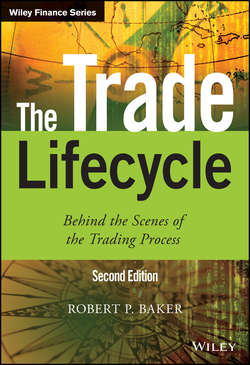Читать книгу The Trade Lifecycle - Baker Robert P. - Страница 14
На сайте Литреса книга снята с продажи.
Part One
Products and the Background to Trading
Chapter 1
Trading
1.4 Means by which trades are transacted
ОглавлениеThis section explains how trading actually takes place.
Brokers
Individuals and small financial entities cannot always get direct access to market makers. This may be due to their unknown credit worthiness, their small volume of trading or their specialised nature. They must rely on brokers to transact their trades. A broker, in return for a commission, will act on their behalf to execute a transaction at a given price or at the best possible price.
Sales departments of investment banks also have a broking function. Customers of the bank may request orders for financial instruments which the sales force transacts on their behalf either at their own bank or using their contacts with other banks.
Exchanges
An organised trading exchange is a safe and reliable place to trade. Prices are published, there is a plentiful supply of all products covered by the exchange and counterparty risk is virtually eliminated. There is a set of products traded, each one is well-defined, eliminating legal risk and liquidity is maintained by the guarantee of a market in each of the products.
Market participants buy or sell a product with the exchange taking the other side of the trade. Members of the exchange ensure that the exchange has sufficient funds to cover any transaction and the members themselves are vetted to ensure they behave according to the rules of the exchange. Examples of exchanges are:
■ London Metal Exchange
■ Chicago Mercantile Exchange
■ New York Stock Exchange.
It is increasingly common for trading to be conducted electronically. Most exchanges have moved beyond open outcry, where participants shout out or visually indicate their requirements and prices. Electronic exchanges work by having participants sending in orders and setting prices across a network of computers connected to the main exchange which publishes all the information simultaneously to all subscribers. This creates a virtual market place: the traders can operate from their own locations without ever meeting their counterparts.
Breaches of security are a greater risk to electronic exchanges – it is essential that the participants are bona fide members of the exchange and that their details, prices and orders are kept secure. There is also communication risk where a computer or network fails in the central exchange or in one location, preventing some or all members from access to the market data.
Over-the-counter
Exchange trades are limited to:
■ members of the exchange
■ certain sets of defined products
■ times when the exchange is open.
If trading is required without these restrictions, it has to be done directly between the counterparties. This is known as over-the-counter (OTC) trading. There is increased flexibility because the counterparties can agree to any trade at any time but the absence of an exchange carries greater risks. Nowadays, much OTC trading is covered by regulation to ensure, inter alia, that both counterparties are competent and knowledgeable enough to trade, and understand the risks entailed.
